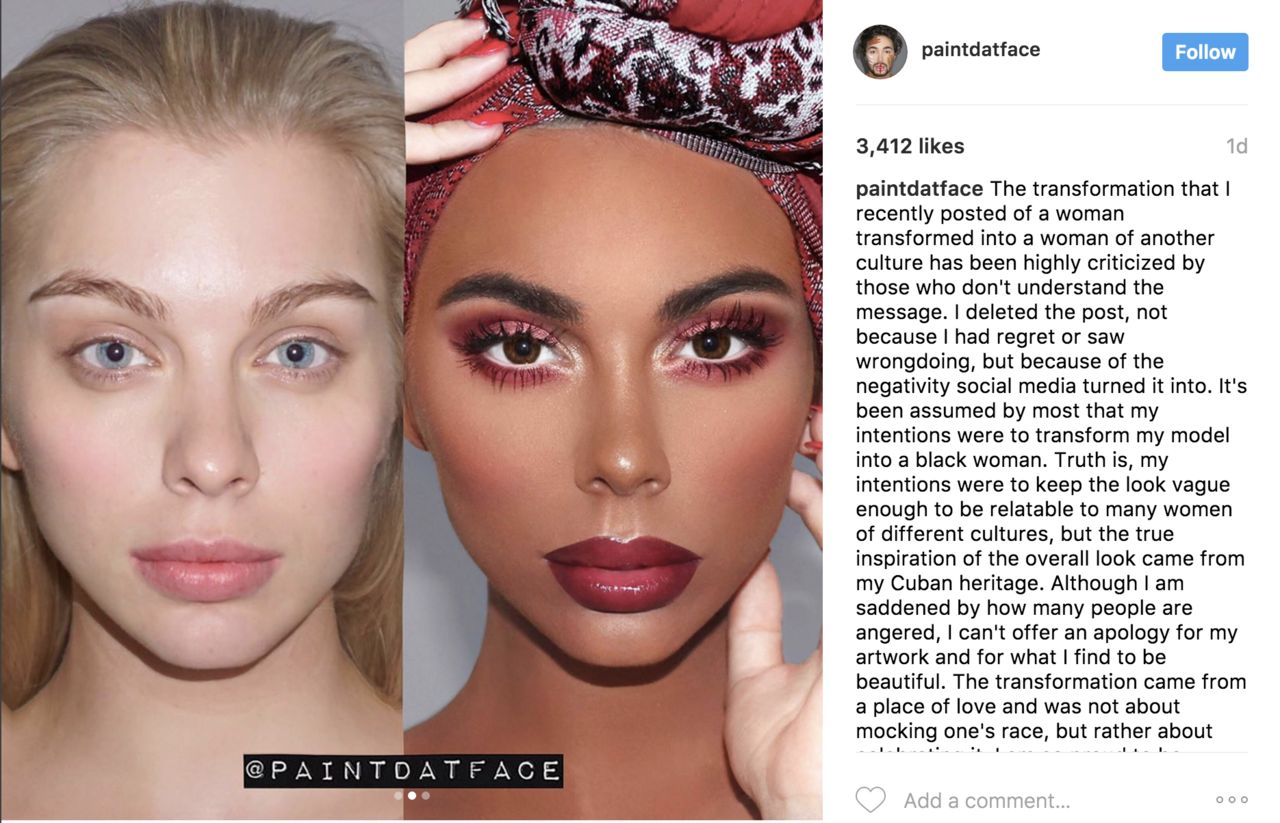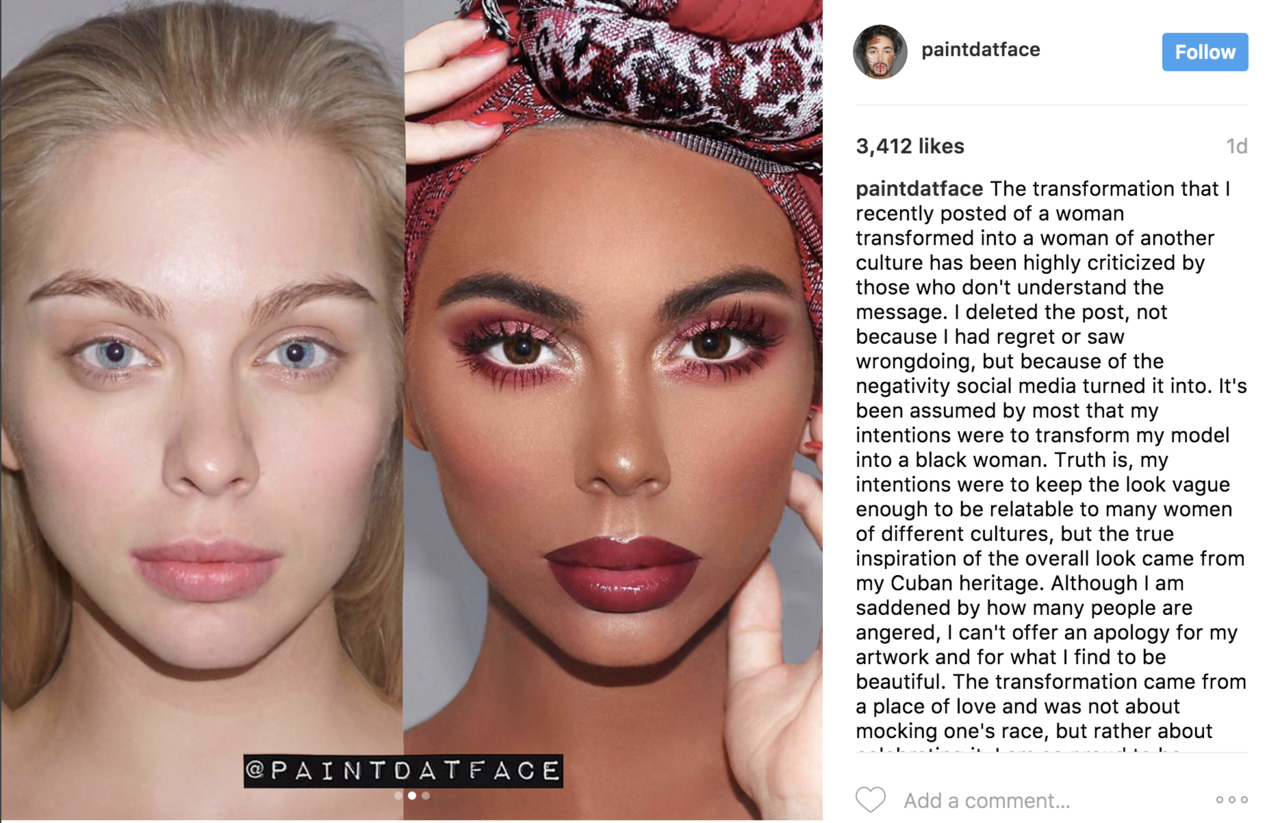Dear Talented Makeup Artists: Blackface Is Never OK

Insta-famous makeup artist @paintdatface faced the wrath of the Internet this week after posting a blackface makeup look on Instagram; he then deleted the original post and reposted it with a nonapology. Why, in 2017, does anyone think blackface is a “look”? Why, when confronted with accusations of cultural appropriation, does anyone respond with defensive ramblings about self-expression and freedom? Cue the heaviest “can’t believe we’re still having this conversation” sigh, and let’s examine where this whole thing went off the rails.
According to his original post, which came with a paragraph-long disclaimer caption, @paintdatface knew from the get-go that there would be people out there who would intentionally misunderstand his vision and message. I guess I’m one of those picket-stick holding, negative people because I take issue with almost every thought in @paintdatface’s original caption as well as his follow-up nonapology (but we’ll get to that a second):
“Disclaimer: I want to clearly express the sincere place I am comingfrom with this transformation. As an artist and visionary, I canbecome bored of the ‘glam’ and done-up looks that we find all oversocial media, my page included. I struggle to remain challenged, andas a result of that, my posts have become more manufactured thanauthentic. This is a transformation that I’ve been holding back fromreleasing for awhile now, solely because of the fear I’ve had ofpeople turning it into a racial scandal against me. THIS IS NOT ABOUTA RACE CHANGE. This is about one woman acknowledging, embracing andcelebrating the beauty of another woman’s culture. I believe we willin a society nowadays that seeks any reason to stomp around town witha picket stick in their hand, fighting ABOUT something rather than FORsomething (and yes, there is a difference!). I didn’t want this tobecome another reason to stir up negativity. This is, by far, theproudest I’ve been of my work and I’m so fortunate to have created itwith @annathorsell, who trusted my vision from the very beginning. Iknow I’m not the best with words and I know that I don’t thank you allenough for all of your continued support, but I’m exited [sic] to finallyconfirm that I’ll be releasing a YouTube channel as a ‘Thank You’ forall you’ve done for me. Now, Let’s Paint.”

I really, really wish we could, collectively, acknowledge that painting a white woman’s skin to make her darker is an egregious affront to women of color. Blackface does not honor, celebrate, or pay homage to any cultures or ethnicities. Makeup artists can celebrate and honor cultures they admire and are inspired by through featuring more models of color. The end. No, really. It’s a tweet-length solution to a centuries-long problem: centering and upholding whiteness as the ultimate beauty ideal. And yet makeup artists will fight tooth and nail and offer up a hundred reasons why blackface is OK. Take a look at @paintdatface’s defensive response to the blackface backlash:
“The transformation that I recently posted of a woman transformed intoa woman of another culture has been highly criticized by those whodon’t understand the message. I deleted the post, not because I hadregret or saw wrongdoing, but because of the negativity social mediaturned it into. It’s been assumed by most that my intentions were totransform my model into a black woman. Truth is, my intentions were tokeep the look vague enough to be relatable to many women of differentcultures, but the true inspiration of the overall look came from myCuban heritage. Although I am saddened by how many people are angered,I can’t offer an apology for my artwork and for what I find to bebeautiful. The transformation came from a place of love and was notabout mocking one’s race, but rather about celebrating it. I am soproud to be illustrating a woman representing several cultures alongwith their achievements, beliefs and histories. Art is interpreteddifferently by all and sometimes it’s uncomfortable, but making thisworld a better place starts with our mindset – thinking positive,showing love and practicing unity.”
Loading
View on Instagram
Let’s take a second to dissect this. @paintdatface is not sorry for his blackface transformation. It was never about race for him. He got bored, wanted to mix it up, and even though women of color have reached out to him to express their feelings, he is not going to apologize. Why? Pick a reason. He’s Cuban, so it’s not blackface. He’s not mocking black people, so it’s not blackface. He’s an artist, so it’s not blackface.
Rather than hiring a model of color, @paintdatface transformed a white woman into a woman of color and called it harmless. It is not harmless. It is, in fact, wholly harmful. Women of color cannot magically transform into white women. We live in a world where whiteness is endlessly promoted through dangerous and sometimes deadly procedures, including skin bleaching. What’s more, being a woman of color is not just skin tone. Painting a white woman any shade of brown or black doesn’t create anything but a white woman painted brown or black. It’s not celebrating the culture it’s imitating. It’s holding a mirror up to whiteness and reflecting white beauty ideals with the contrast turned way up.
When influencers, no matter how large or small their platform, normalize acts like blackface, they are effectively telling their entire following that racism is not only OK but defensible self-expression. It’s a classic case of centering: @paintdatface told his followers and anyone who saw his posts that his self-expression mattered more than the lived experiences of hundreds of thousands of women whose lives and deaths have been dictated by the color of their skin. This kind of centering paves the road for even more ignorance to take center stage. In hopes that we never have to have this discussion again, let’s briefly go over the myriad of ways this whole thing was not OK and should not be repeated ever again.
Blackface is always about race.
#paintdatface if it wasn't about race you wouldn't have needed a four page long disclaimer
— Leila Ellis-Nelson, Psy.D. (@DrEllisNelson) May 29, 2017
Blackface is never a compliment.
https://twitter.com/tea_bing/status/868799939840790528
If you are considering “experimenting” with blackface, reconsider.
The entire thing is ALREADY offensive. You know what wouldn't have been offensive? Using an actual black woman
— Miranda Priestly’s Hair (@naledimashishi) May 28, 2017
To all the talented makeup artists who are debating “creating” ethnic looks: Please stop. You are hurting women of color. You are encouraging systematic devaluing of the features you claim to be inspired by. Blackface is blackface is blackface, and frankly, I’m tired of talking about it.
Related Stories:
-“I Want to Show Girls It’s Not Bad to Be Dark—Different Is Beautiful”
-This Black Model Recreated Popular Ad Campaigns To Make A Statement About Representation And Diversity
–Dear White People‘s Antoinette Robertson Opens Up About the Complexities of Black Beauty Ideals

